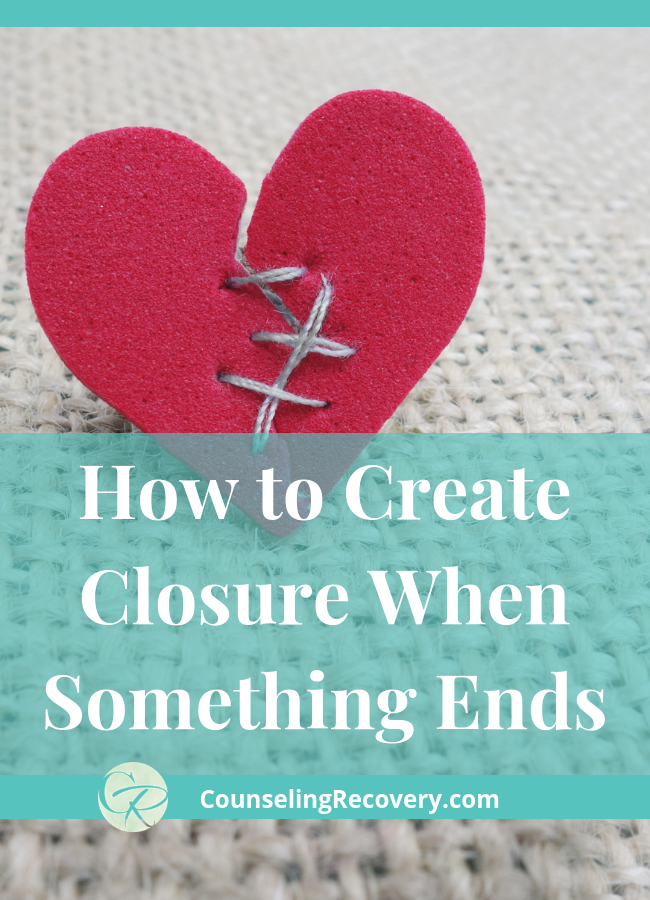How to Create Closure When Something Ends
With any kind of loss or significant change, you need to let ourselves embrace the grief to find closure. The message we get is that it’s okay to hurt - but not for long. Most people assume you’re fine after a month or so, but there is no time limit for getting over loss.
Maybe it’s a relationship that ended, someone has died, or you went through an unexpected change, and your life was thrown out of whack.
Endings, though painful, are a natural part of life but when they aren’t processed, you miss a valuable lesson.
The gift in closure is being able to finally let something precious go.
When you can’t release the pain, it feels unfinished. You find yourself carrying the same hurt around like a blanket because you’re not finished hurting. The pain of that experience is still inside of you with no where to go.
This blog provides tips for how to create closure so that you can heal and move forward in your life.
Fear of Getting Stuck
Most people don’t know how to process endings. Feeling grief takes a painstaking amount of effort and a willingness to ride out the emotions. It’s not a linear process, and expecting to be over it quickly isn’t realstic.
A common fear is that if you let yourself feel the feelings, you’ll never stop crying. Feeling the feelings may feel unproductive but it’s the only way through the pain.
Depending on the type of loss, it can take anywhere from several weeks to years to complete the process. Ignoring any significant change or loss makes that experience linger longer than it should.
Common losses include:
Moving to another city and starting over
Someone close to you dies
A relationship or job suddenly ends
A unexpected change or trauma happens
A loss due to natural disasters
Create a Healing Foundation
There are two things you need to put in place when going through a loss. First, make sure you have a solid support system. If friends are scarce, find a support group or community to help you feel less alone. If you prefer something more private, counseling can be a nurturing way to talk things out without judgment.
Second, increase your self-care. Always start with the basics like getting enough sleep, healthy food and exercise to keep you physically balanced.
Part of emotional self-care is finding healthy ways to comfort yourself. Avoid using food or other substances to cope because those things will dull the pain but not resolve it.
Honoring the pain takes a lot of courage to embrace the pain. The more you can let the feelings out, the more likely the pain will eventually lessen as you begin to let it go and create something new.
The Value of Reflection
When going through grief, give yourself a place to feel it. Some people spend time in nature or a place that comforts them. Or, set up an alter in your home as a way to create a calming space.
For instance, you could have a table with special mementos, personal writings, books, candles, and relaxing music, to serve as a healing station for you. This becomes your go-to-place when you are grieving or needing to be alone.
There is an old saying - what we resist persists and that’s especially true for what we don’t want to feel.
Take Stock of What Happened
It’s important to let yourself feel all of the feelings associated with your experience.
For instance, a failed relationship is an opportunity to examine your own behavior. Looking at what went wrong can provide interesting insights. By understanding what didn’t work you can use that knowledge improve yourself and your relationships.
Most of us repeat the same patterns, not because we’re lacking but because we don’t know what part we played in the outcome. It’s important to look at both the positive and negative ways that you’ve contributed.
Here are some initial questions to help get you started.
Questions to Acknowledge Progress:
How did you contribute to the situation?
What are you most proud of accomplishing there?
Where did you grow the most?
What positive feedback did you receive?
How have others acknowledged you?
Keep in mind that this is not an exercise in beating yourself up. Part of growth is acknowledging your weaker areas to help you grow. Ignoring them creates more shame.
The Gift in the Lesson
As the grief subsides, finding the lesson is an important part of getting closure. Once you can see the value embedded in your experience, you’re able to find the gift.
For me, last year was about accepting other people’s limitations. Not everyone will stay in our lives despite how much we want them to. After embracing my grief, I had to learn to be my own BFF. While it was a very painful process, I wouldn’t change it for anything.
It made me treasure my family and friends even more because the ones that are willing to go the distance are the true gifts of life.
Create Healthy Closure
There is nothing like the feeling of closure. When you can get through the pain and come out the other side, you reap the benefits. John Bradshaw, the creator of the famous PBS series on The Family, said that you cannot have a healthy relationship unless you can acknowledge the goodbye.
Being able to have closure meant I could be at choice in my relationships. Pain is inevitable but suffering is optional.
Give yourself the time it takes to stay in the process. If we don’t have the courage to examine what happened, how can we learn to create something better?

